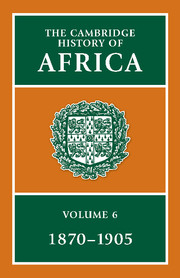Book contents
- Frontmatter
- Introduction
- 1 Africa on the Eve of Partition
- 2 The European Partition of Africa: Origins and Dynamics
- 3 North Africa
- 4 Western Africa, 1870–1886
- 5 Western Africa, 1886–1905
- 6 Western Equatorial Africa
- 7 Southern Africa, 1867–1886
- 8 Southern and Central Africa, 1886–1910
- 9 Portuguese Colonies and Madagascar
- A Angola and Mozambique, 1870–1905
- B Madagascar and France, 1870–1905
- 10 East Africa 1870–1905
- 11 The Nile Basin and the Eastern Horn, 1870–1908
- 12 The European Scramble and Conquest in African History
- Bibliographical Essays
- Bibliography
- Index
- Map 9 West Africa, c. 1870">
- Map 10 West Africa, c. 1905
- Map 13 The Congo Independent State
- Map 26 Ethiopia, the Nile Valley and the Horn in the era of Menelik II
- References
A - Angola and Mozambique, 1870–1905
from 9 - Portuguese Colonies and Madagascar
Published online by Cambridge University Press: 28 March 2008
- Frontmatter
- Introduction
- 1 Africa on the Eve of Partition
- 2 The European Partition of Africa: Origins and Dynamics
- 3 North Africa
- 4 Western Africa, 1870–1886
- 5 Western Africa, 1886–1905
- 6 Western Equatorial Africa
- 7 Southern Africa, 1867–1886
- 8 Southern and Central Africa, 1886–1910
- 9 Portuguese Colonies and Madagascar
- A Angola and Mozambique, 1870–1905
- B Madagascar and France, 1870–1905
- 10 East Africa 1870–1905
- 11 The Nile Basin and the Eastern Horn, 1870–1908
- 12 The European Scramble and Conquest in African History
- Bibliographical Essays
- Bibliography
- Index
- Map 9 West Africa, c. 1870">
- Map 10 West Africa, c. 1905
- Map 13 The Congo Independent State
- Map 26 Ethiopia, the Nile Valley and the Horn in the era of Menelik II
- References
Summary
The inception of the scramble for Africa obliged Portugal to act on what had been an established ideal for many centuries. Whereas their contemporaries in other European countries had eschewed the acquisition of territory, many Portuguese had envisaged the ultimate conquest and consolidation of the territories in the hinterland of their coastal settlements in Angola and Mozambique. That these ideas never bore fruit resulted from the lack of urgency, the inadequacy of Portuguese resources, and, above all, the successful resistance of African peoples to those plans which actually were initiated. However, when other Europeans began to show an interest in the lands of central Africa, Portugal chose to marshal its limited resources in a concerted effort to secure as much territory as possible. Because of this effort, Portugal eventually received recognition from the other powers of its right to exploit the vast land areas of Angola and Mozambique. Yet, the same lack of resources which had delayed the conquest of these regions for such a long time played a crucial role in determining the pace of the establishment of effective occupation and the nature of Portuguese colonial control.
Even in 1885 Portugal occupied only a small portion of the territory which would ultimately be recognised as Angola. There was a degree of irony in the fact that the Berlin Conference of that year enunciated the doctrine of effective occupation, since Portugal had recently completed a withdrawal from the interior.
Keywords
- Type
- Chapter
- Information
- The Cambridge History of Africa , pp. 493 - 521Publisher: Cambridge University PressPrint publication year: 1985
References
- 2
- Cited by

